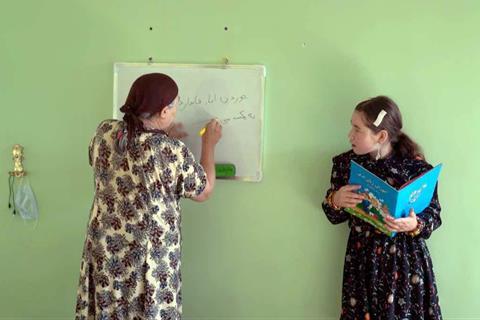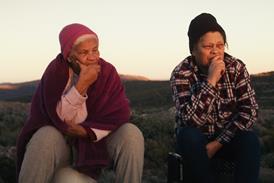IDFA breakout charts one Afghan mother’s quest to educate herself - just as the Taliban rolls into Kabul

Dir: Najiba Noori. France/Netherlands/Qatar/Afghanistan. 2024. 84mins
Afghani mother-of-six Hawa is 53 years old, and she has made the decision that now is the time for her to learn how to read, write, and start her own business. It’s 40 years since she was forced into marriage at the age of 13 – to a man 30 years her senior. But the Taliban roll into Kabul just as Hawa’s dreams are coming to fruition. The twist is that her story is filmed and narrated by an observer who is one of the children she put her life on hold for – her journalist daughter Najiba.
An angry documentary in some very good ways
This famillal closeness enriches what might otherwise have been a simple, stirring story of one woman’s self-empowerment and the crisis that jeopardises it. Writing Hawa is an angry documentary in some very good ways, about how a repressive patriarchal regime cancelled the independence, education, and careers of millions of Afghan women. But it’s also an intimate film that touches on how it feels to become your mother’s friend and hear her confess, for example, that if it hadn’t been for her children (and we’re fully aware that one of these children is holding the camera), she would have run away with the man she truly loved – her husband’s cousin.
Shot over five years, Writing Hawa becomes a touching exploration of a delayed emancipation that is also a recalibration of the parent-child rapport and a lament for what might have been if the United States had not – in the director’s voice-over words – “decided the fate of the Afghan people on our behalf”. Dutch co-producer Een van de Jongens has planned an ‘impact campaign’ centred on a film that premieres at IDFA, with diaspora screenings, ‘decision-maker’ screenings and a drive to recruit online teachers for Afghan girls. But with its emotional depth, elegant editing and poignant soundtrack of traditional Afghani strings and percussion, Writing Hawa also has the potential to make its way into theatres and onto screening platforms, perhaps even generating some awards-season buzz eventually down the line.
The film opens with footage shot from a plane coming into land in August 2021, accompanied by the director’s own melancholy voiceover. The day previously, we learn, she had been in her office in Kabul, with no idea that less than 24 hours later she’d be on a plane to Paris carrying everything she could cram into a small rucksack. One of the many things she left behind, Najiba Noori tells us, was “the film about my mother” – and, jumping back a few years, it is this that now begins to play out.
Shot mostly within the confines of the Noori family’s simple, neat apartment in Kabul, it really is all about Hawa, with brief appearances from other family members and friends. Unschooled but clearly smart and ambitious, Najiba’s mother early on announces a double decision that has clearly been maturing for a while. She wants to set up a small retail business that specialises in the embroidered Hazara garments from her snowy home province of Bamiyan. And she wants to learn to read and write.
Hawa was married off aged 13 to Najiba’s father, a cranky old soul who has now fallen prey to dementia – though in his more lucid moments he uses guilt and emotional blackmail to keep his wife ministering to him. It doesn’t take us long to do the maths: the age gap between Hawa and her eldest kids is less than half that between her and this old guy reclining in the corner. This, it occurs to us, must be quite common in Afghanistan, and it creates a family dynamic that overlays the mother-daughter rapport with a sisterly vibe that brings a frisson of shy solidarity to each scene.
Najiba films while taking part in family confabs and arguments, while questioning her mother and responding to her questions, as if the camera were somehow embedded in her eyes. TV news reports act as a Greek tragic chorus, charting the advance of Taliban forces in Afghanistan following the Doha peace accords and the increasing crackdown on female liberty even before they take over the capital.
But there are moments of humour too – as when Hawa’s grandchildren turn teachers, coaching her through her spelling and reading tasks and correcting homework. And just when we’re beginning to think that, however touching and stirring the story is, it’s perhaps a little one-note, there’s a real-life dramatic twist that injects shock, vigour and renewed indignation.
“Our parents were idiots,” remarks Hawa with a bitter laugh to a friend back in Bamiyan, who was similarly forced into marriage with a much older man while still a child. Writing Hawa shows how the gains of an entire generation of Afghan women determined not to repeat that idiocy for their own daughters was reversed from one day to the next – but also, in its spirit of guerrilla-shot defiance, it also offers hope for the future.
Production companies: Tag Film, Een van de jongens
International sales: First Hand Films, sales@firsthandfilms.com
Producers: Christian Popp, Hasse van Nunen, Renko Douze
Screenplay: Najiba Noori, Asfaneh Salari
Editing: Asfaneh Salari
Cinematography: Najiba Noori, Rasul Noori
Music: Afshin Azizi

























No comments yet